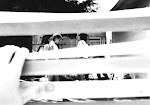
I once pointed out to my son, as he struggled with his English homework, that the school is essentially trying to teach him a language he already speaks. I said this to give him confidence, but it illustrates the backwards nature of English as a subject. We learn to speak English, and to a lesser extent write it, informally, via parents, books, television and everything that goes on around us. In other words, we learn by imitation. We don't learn anything about the bones of the language. And then school comes along and tries to stuff those bones into what we already know and in the process they often end up turning the English language into something dull and unappetizing.
Let me just say that I like grammar when it is nicely done. I'm particular about the subjunctive (if she were, not if she was) and various other archaisms. Parsing a sentence, and seeing exactly how the words have their own place and yet work together, has the same excitement for me as a medical student might feel watching the dissection of the muscles of the arm. But how did I learn grammar? Truthfully, not in elementary school or middle school "Language Arts," no matter how many times we were tested on it. None of that stuck. No, I learned in high school, when I took Latin. Suddenly I had to know all the verb tenses, and the difference between an indirect object (the dative case) and the direct object (the accusative case.) And when I knew Latin well I suddenly looked back at English and understood everything I had forgotten so many times. And it seemed easy.
Some things have changed for the better in school, but English grammar instruction has not. I can say this because my son's school uses the popular "Shurley Method" to teach it. Shurley uses jingles to teach everything and yes, that does make it easier to remember. And Shurley does make sentence structure easier, although after the poor sentence has been parsed it's an obsessive-compulsive's nightmare of PPV, HV, SN, PPA and a dozen other labels. But I think when you have an English grammar system that requires students to memorize all 49 prepositions and 23 helping verbs the lunatics have taken over the asylum.
No one ever learned English by memorizing prepositions.
No one ever learned any language by memorizing prepositions.
Having to memorize prepositions is like having to memorize road signs. You see a road sign, you know what it is. No one is supposed to run around with a catalog of all possible road signs in their head, and if they did it wouldn't help much. The brain just doesn't work that way.
Did I also mention that this particular test required him know the prepositions in alphabetical order as well?
I just hope that somehow my son, and all the other Shurley kids, survive this instruction and come to realize that the English language was not specifically invented as an instrument of torture designed to ruin an 11 year old's weekend.
If not, I guess I can always enroll him in Latin.
Let me just say that I like grammar when it is nicely done. I'm particular about the subjunctive (if she were, not if she was) and various other archaisms. Parsing a sentence, and seeing exactly how the words have their own place and yet work together, has the same excitement for me as a medical student might feel watching the dissection of the muscles of the arm. But how did I learn grammar? Truthfully, not in elementary school or middle school "Language Arts," no matter how many times we were tested on it. None of that stuck. No, I learned in high school, when I took Latin. Suddenly I had to know all the verb tenses, and the difference between an indirect object (the dative case) and the direct object (the accusative case.) And when I knew Latin well I suddenly looked back at English and understood everything I had forgotten so many times. And it seemed easy.
Some things have changed for the better in school, but English grammar instruction has not. I can say this because my son's school uses the popular "Shurley Method" to teach it. Shurley uses jingles to teach everything and yes, that does make it easier to remember. And Shurley does make sentence structure easier, although after the poor sentence has been parsed it's an obsessive-compulsive's nightmare of PPV, HV, SN, PPA and a dozen other labels. But I think when you have an English grammar system that requires students to memorize all 49 prepositions and 23 helping verbs the lunatics have taken over the asylum.
No one ever learned English by memorizing prepositions.
No one ever learned any language by memorizing prepositions.
Having to memorize prepositions is like having to memorize road signs. You see a road sign, you know what it is. No one is supposed to run around with a catalog of all possible road signs in their head, and if they did it wouldn't help much. The brain just doesn't work that way.
Did I also mention that this particular test required him know the prepositions in alphabetical order as well?
I just hope that somehow my son, and all the other Shurley kids, survive this instruction and come to realize that the English language was not specifically invented as an instrument of torture designed to ruin an 11 year old's weekend.
If not, I guess I can always enroll him in Latin.









